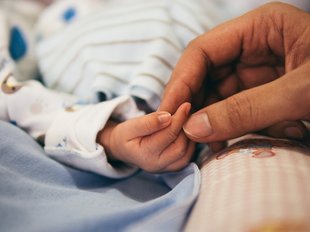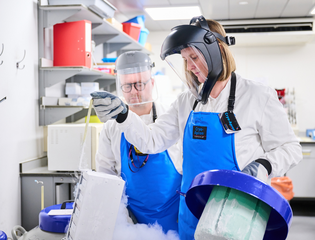Starting a family with a genetic fault

Family
Chance of passing gene faults (also known as mutations) on
Whether you’re a man or a woman, if you have a mutation such as BRCA1, BRCA2 or Lynch syndrome then there is a 50% chance of passing the mutation on each time you have a child. This is the case whether you have girls or boys.
What if we both have a genetic mutation?
There are a few possible outcomes if both parents carry a BRCA1/2 gene mutation:
- There is a one in two chance that your child will inherit a single BRCA1/2 gene mutation and a one in four chance that your child will not inherit any BRCA1/2 gene mutation at all. There is also a one in four chance that they will inherit both of the mutations.
- If one parent has a mutation in their BRCA1 gene and the other in their BRCA2 gene and the child inherits both, then their risk of developing breast or ovarian cancer is that of a BRCA1 carrier.
- If a child inherits the BRCA2 gene mutation from both sides, then they will have something called Fanconi anaemia, which affects the bone marrow and results in decreased production of all types of blood cells. This disorder can lead to shorter growth, a smaller head and underdeveloped thumbs. Fanconi anaemia also puts the child at higher risk of early childhood cancers, leukaemia and Wilms tumours in the kidneys.
Is it ok to start a family if I have a genetic mutation?
There is no right or wrong here, and many people have very different opinions on this topic. It’s important to talk these things through with your partner, speak to your genetic counsellor about your options, and do what is right for you and your family.
Some of your options include:
Having your children as normal
If you have Lynch syndrome or a BRCA1/2 gene mutation, you have a 50% chance of passing it on to each child you have, but you can have your children as normal. These mutations are not a guarantee that cancer will develop, and it’s possible that there will be better screening and treatment of ovarian cancer and other cancers over the next few decades. These genetic mutations do not cause childhood cancers, so any child born today will not be at risk for many years and your child would not need to be tested until they were an adult and made the decision for themselves.
Adoption
Adoption of a child that is not genetically related to you. For information on this option, see here.
PGT-M, previously known as preimplantation genetic diagnosis (PGD)
This is a procedure that aims to allow families to avoid passing on an inherited condition to their children. It is only available to parents who haven’t already conceived naturally.
For this procedure you will have to undergo in vitro fertilisation (IVF). This involves collecting your eggs and fertilising them with your partner’s sperm in a laboratory. Cells from your fertilised eggs (embryos) are then tested for a gene mutation.
An embryo that does not have the gene mutation is then transferred to your womb and then your pregnancy is allowed to continue as normal. Any remaining, non-mutated embryos can be frozen for use in future cycles. The success rate for PGT-M is around 20%.
According to NHS England’s clinical commissioning policy up to three cycles of PGT-M are available on the NHS in the UK; but only one unaffected child will be funded. Referrals for PGT-M will need to go through the genetics service so, if you would like to consider this procedure, speak to your genetics specialist. For more information visit www.geneticalliance.org.uk.
Pre-natal testing
Early on in a pregnancy it is possible to test for inherited genetic mutations. You will then have a choice whether to carry on with the pregnancy or terminate it early.
This is an invasive procedure with a slight risk of miscarriage. For more information about pre-natal testing and the options available to you, you can speak to your genetics specialist, gynaecologist or GP.
Egg or sperm donation
Depending on whether it’s the future mother or father that has the mutation then egg or sperm donation can be considered to avoid passing on the genetic mutation.
If the mother is the carrier of the mutation, eggs can be donated and if the father is the carrier, sperm can be donated. Once donated, IVF can be carried out.
Testing children for BRCA and Lynch syndrome
Children are not routinely tested for these genetic mutations, as their risks of cancer are not increased in childhood.
The youngest a person can usually be tested is at age 18, though this should be their own choice to make as an adult.
If you have any questions please contact info@ovarian.org.uk.
